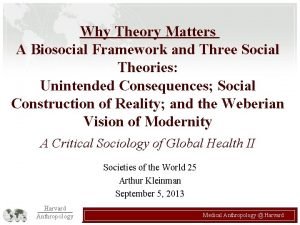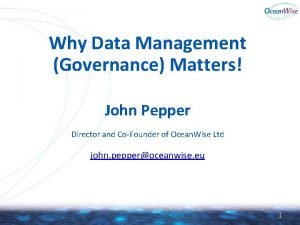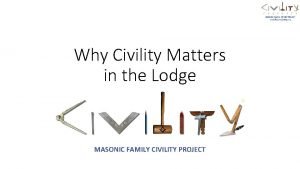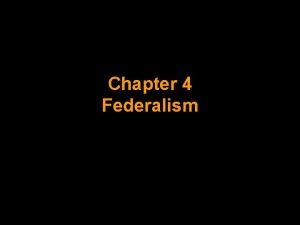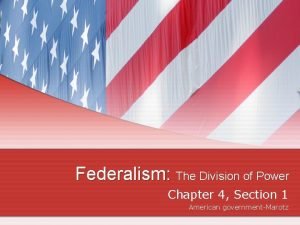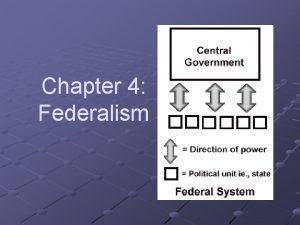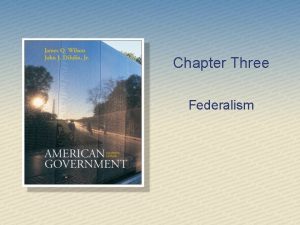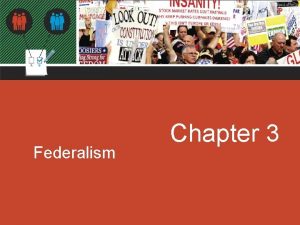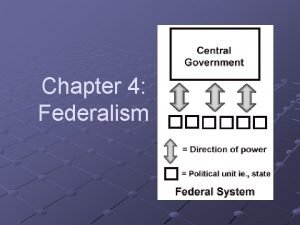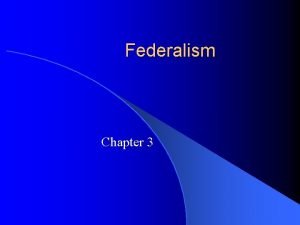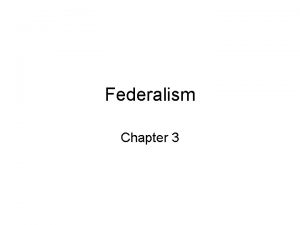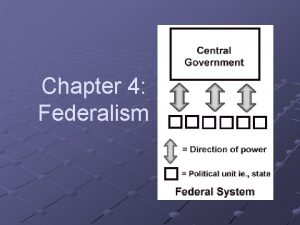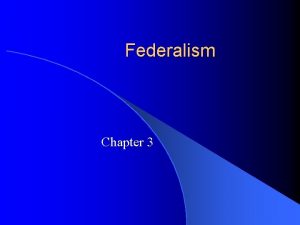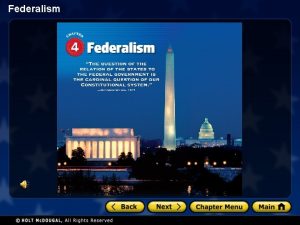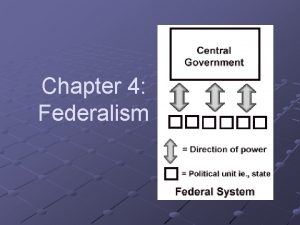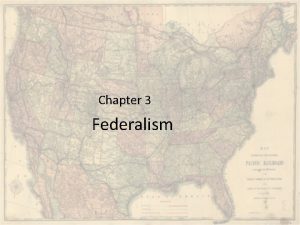Chapter 3 Federalism Why Federalism Matters Federalism a
















- Slides: 16

Chapter 3 Federalism

Why Federalism Matters • Federalism: a constitutional division of power between the national and state levels of government. • State governments have the authority to make final decisions over many governmental actions. • The most persistent source of political conflict is between national and state governments.

Dual Federalism (layered cake) – distinct levels - Prominent from 1789 – about the 1930 s/40 s Congress, President, Judicial System National Government Governor, State Assembly, Judicial System State Governments Mayor, City Managers, City or County Commissions Judicial Systems Local Governments

Terrorist Attacks Disaster Relief Job Training Airports Highways Social Programs Education Housing Infrastructure Cooperative Federalism (marble cake) – “intermingling of responsibilities”



Sometimes there is an “overlap” Concurrent Powers Taxes Roads Pass & enforce law

Sometimes there is conflict. . . immigration…. healthcare National Powers State Powers

State vs. Federal power • Many modern debates reflect those of the antifederalists (states rights) and federalists (federal power) • Constitutional features that have led to the growth of the federal government’s power: • • • Necessary and proper clause - Congress Supremacy clause – federal law supreme to state Commerce clause – interstate and foreign General welfare clause - Preamble Congress’ power of the purse (tax and spend)

State vs. Federal Power • Policies that have increased federal power: • Categorical grants: grant designed for a specific purpose; states must spend money in accord with national government’s wishes (different from block grants) • Federal mandates: federal government tells states what policies to implement • Selective incorporation: federal courts can overturn state and local practices (VERY important in civil rights and civil liberties)

State vs. federal power • Acts of Congress that greatly increased federal gov’t’s power: • Civil Rights Act of 1964 – Commerce clause • Americans with Disabilities Act (1990) – unfunded mandate; commerce clause used to require businesses of a state to comply • The Clean Air Act of 1970 – unfunded mandate; air quality standards – required states to administer and appropriate funds

State vs. Federal Power • Laws and policies that have increased the power of the states (‘devolution’): • Welfare Reform Act of 1996: states given power and money to run their own welfare program; discretion to determine how to transfer people from welfare to work • Block Grants: grants that have few strings attached, so states make decision about the details of where the money goes • Tenth Amendment

• What trends do you notice? What causes these? • Block Grants: states get more resources from federal gov’t; leads to hiring • Federal Mandates: federal government requires states to do more; federal gov’t considers goal achieved via mandate Copyright © 2013 Cengage

SCOTUS Cases for Federalism (OYEZ. org) Increase federal power (John Marshall!) • Marbury v. Madison (1803) – Judicial Review • Mc. Culloch v. Maryland (1819) – necessary and proper clause (tax on federal bank) • Gibbons v. Ogden (1824) – interstate commerce - (waterway monopoly) “Devolution” cases • US v. Lopez (1995) (gun free schools) • US v. Morrison (2000) (Violence Against Women Act)

Figure 3. 2 The Changing Purpose of Federal Grants to State and Local Governments

Copyright © 2013 Cengage
 Pictures
Pictures Why punctuation matters
Why punctuation matters Why productivity matters
Why productivity matters Standard data quality dimensions kpmg
Standard data quality dimensions kpmg Why was every child matters scrapped
Why was every child matters scrapped Why patient experience matters
Why patient experience matters Why closing the word gap matters
Why closing the word gap matters Biosocial framework
Biosocial framework Why data governance matters
Why data governance matters Why productivity matters
Why productivity matters Why motivation matters
Why motivation matters Masonic civility
Masonic civility Don't ask why why why
Don't ask why why why Federalism powers divided worksheet
Federalism powers divided worksheet Chapter 4 section 1 federalism the division of power
Chapter 4 section 1 federalism the division of power Chapter 4 federalism the division of power
Chapter 4 federalism the division of power Chapter 4 federalism
Chapter 4 federalism







